 I’m not here for the idea of making links to a bunch of previous movies, but some quick and uncertain mental math tells me that Shang-Chi and the Legend of the Ten Rings relies on four previous and mostly unconnected MCU movies[1] to explain its backstory. (Six if you care about the Blip.) None of these movies include Shang-Chi in a credited role, or even acknowledge his existence. And I mean… I’ve read within a small rounding error of 100% of 25 years’ worth of Marvel comics, so I’m obviously here for it, but that is noticeable weight of continuity to labor under, you know?
I’m not here for the idea of making links to a bunch of previous movies, but some quick and uncertain mental math tells me that Shang-Chi and the Legend of the Ten Rings relies on four previous and mostly unconnected MCU movies[1] to explain its backstory. (Six if you care about the Blip.) None of these movies include Shang-Chi in a credited role, or even acknowledge his existence. And I mean… I’ve read within a small rounding error of 100% of 25 years’ worth of Marvel comics, so I’m obviously here for it, but that is noticeable weight of continuity to labor under, you know?
Anyway, the plot is the plot and yes I want to see it again, but nobody is interested in an MCU spoiler review, not even two weeks late like this one basically is. But between a pre-verbal child and Covid, it’s harder to get to the theater on time than it used to be, you know?
What I am interested in is the things that were cribbed from the comics, with which I have a more than passing familiarity[2]. Master of Kung Fu (as a comic) focused on two things. First, both in importance and chronology, a generation-later retelling of the old Fu Manchu stories with a lot of those characters still in play. Fu Manchu is as yellow-perily as ever, and the British spies who oppose him are likewise as clichedly British. Only, now he (Fu) has a daughter set up as his heir apparent[3], and a finely-honed, kung fu assassin-trained son who has turned against him for being, y’know, evil and whatnot. And second, once the comic wasn’t all Fu all the time, it also focused on being a British spy agency story in which Shang-Chi traveled the world with James Bond’s nephew[4] doing superhero-adjacent spy stuff and living out a spy-girlfriend relationship to a Fleetwood Mac soundtrack.
The movie only focuses on the first of those, except obviously not using Fu Manchu and instead pulling in the so-called Mandarin and his ten rings, by way of the terrorist organization we’ve seen before, all the way back in the very first MCU movie. But then it also pulls in a lot of Iron Fist’s mythology, what with an extra-dimensional kung fu city that you can only get to every so many time intervals, unless you know secret ways; and also, their kung fu is magical wuxia kung fu. Sad to be the guy who played Danny Rand in the Netflix show, but zero percent sad to see the expert martial artist not be some random white dude.
My point, if indeed I had one, is that if you were going to cram a mildly problematic Iron Man villain named the Mandarin together with Marvel’s two martial arts characters, this is pretty much the best way to have done so. And furthermore, if you weren’t going to cram those together into one story but instead spread them out among three, well, probably you should cram them together instead.
[1] And a “Marvel One-Shot” that I’d seen before as a Blu-ray extra, which was released on Disney+ two weeks before Shang-Chi’s release date, to minimal fanfare.
[2] While that is a verified fresh statement, I honestly didn’t remember most of these things until the end of the movie. I spent like 2 hours saying to myself “I don’t remember Shang-Chi having a sister,” for example, until suddenly I was all “oh yeah” instead.
[3] Not that he intends to ever do anything so gauche or pedestrian as dying, but still: contingencies.
[4] Among others, but the more important point is that I’m serious about that.
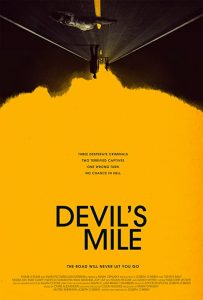 I almost wish Devil’s Mile had been bad, because that would be easier to take. But (except for the effects, which were cheap and looked it) instead it was consistently nearly really good, and I don’t even know exactly what I would have done to fix it, which is somehow even worse than all the rest.
I almost wish Devil’s Mile had been bad, because that would be easier to take. But (except for the effects, which were cheap and looked it) instead it was consistently nearly really good, and I don’t even know exactly what I would have done to fix it, which is somehow even worse than all the rest.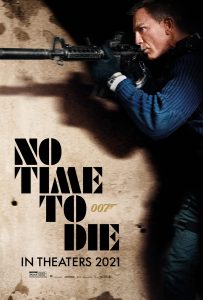 I’m still not entirely comfortable with the fact that all of the Daniel Craig Bond films have shared a continuity and an ongoing story arc. I mean, yes, it’s great from a storytelling perspective. But it’s not really how James Bond movies work, traditionally?
I’m still not entirely comfortable with the fact that all of the Daniel Craig Bond films have shared a continuity and an ongoing story arc. I mean, yes, it’s great from a storytelling perspective. But it’s not really how James Bond movies work, traditionally?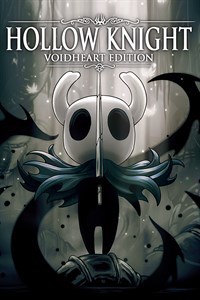 I still don’t understand why games that are roguelike are named after the original game of that style, Rogue, while games that are Metroid-like (ie, exploration-platformers with boss fights and power-ups) are named after more than a decade later when Castlevania did the same thing, and someone decided they were equivalent and everyone else agreed. It’s just not right.
I still don’t understand why games that are roguelike are named after the original game of that style, Rogue, while games that are Metroid-like (ie, exploration-platformers with boss fights and power-ups) are named after more than a decade later when Castlevania did the same thing, and someone decided they were equivalent and everyone else agreed. It’s just not right. The thing that made I Spit on Your Grave[1] more than torture porn [before that was even a subgenre] is the novelty. There aren’t many lady revenge stories, and fewer that are violent in the way that dude revenge stories are violent. As such, it has both the typically female strength storyline in which a woman who has faced, uh, let’s say adversity is able to rise up from circumstances that would destroy a man[2], and then it follows that up with the direct, bloody revenge that has, as I said, been a traditionally male-dominated arena.
The thing that made I Spit on Your Grave[1] more than torture porn [before that was even a subgenre] is the novelty. There aren’t many lady revenge stories, and fewer that are violent in the way that dude revenge stories are violent. As such, it has both the typically female strength storyline in which a woman who has faced, uh, let’s say adversity is able to rise up from circumstances that would destroy a man[2], and then it follows that up with the direct, bloody revenge that has, as I said, been a traditionally male-dominated arena.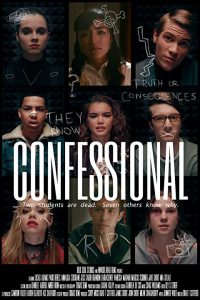 I hate it when research disproves a theory that superficially matches all available facts. See, the main thing that
I hate it when research disproves a theory that superficially matches all available facts. See, the main thing that 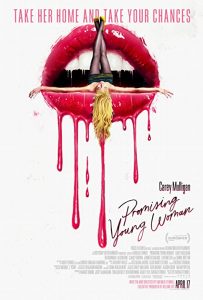 Every movie I watched in early 2020, according to a memory that is at worst only slightly flawed in this regard, had a preview for
Every movie I watched in early 2020, according to a memory that is at worst only slightly flawed in this regard, had a preview for 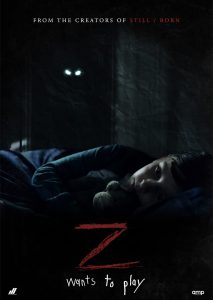 Shudder served me up a more bog standard traditional horror this time, and I’m maybe a little disappointed by it? It’s not that I’m itching to become a giallo aficionado or anything. It’s just that horror in the ’70s is so good. If I were the kind of person who got paid for this, I might call it raw so that I could proceed to call it visceral as well, and be proud of myself for the pun. But what I really mean is, that was when the genre first spread its wings. You had a little blood and a lot of screaming and maybe some goofy eastern European accents, or maybe you had rubber-suited “monsters” or perspective shots and miniatures to make every day critters giant-sized. But the ’70s is where the technology improved and at the same time the censorship limits were removed, and the field just exploded in every direction. By 2019, horror movies are often a lot more polished, but they’re also more prudish and maybe a little dead inside, from that sweet sweet studio money.
Shudder served me up a more bog standard traditional horror this time, and I’m maybe a little disappointed by it? It’s not that I’m itching to become a giallo aficionado or anything. It’s just that horror in the ’70s is so good. If I were the kind of person who got paid for this, I might call it raw so that I could proceed to call it visceral as well, and be proud of myself for the pun. But what I really mean is, that was when the genre first spread its wings. You had a little blood and a lot of screaming and maybe some goofy eastern European accents, or maybe you had rubber-suited “monsters” or perspective shots and miniatures to make every day critters giant-sized. But the ’70s is where the technology improved and at the same time the censorship limits were removed, and the field just exploded in every direction. By 2019, horror movies are often a lot more polished, but they’re also more prudish and maybe a little dead inside, from that sweet sweet studio money.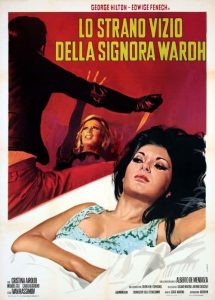 Unexpectedly, two movies in a row on my tragically massive Shudder watch list were giallos[1].
Unexpectedly, two movies in a row on my tragically massive Shudder watch list were giallos[1]. 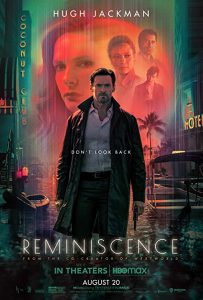 It’s not really clear to me what Kevin Feige is going to do when he tries to introduce the X-Men into the MCU. Not only has Hugh Jackman refused to play Wolverine again, but he apparently got the mutton chops in the divorce with Fox. Seriously, bro looks within an approximation of no differently than he did in 1999.
It’s not really clear to me what Kevin Feige is going to do when he tries to introduce the X-Men into the MCU. Not only has Hugh Jackman refused to play Wolverine again, but he apparently got the mutton chops in the divorce with Fox. Seriously, bro looks within an approximation of no differently than he did in 1999. I’m not here for the idea of making links to a bunch of previous movies, but some quick and uncertain mental math tells me that
I’m not here for the idea of making links to a bunch of previous movies, but some quick and uncertain mental math tells me that